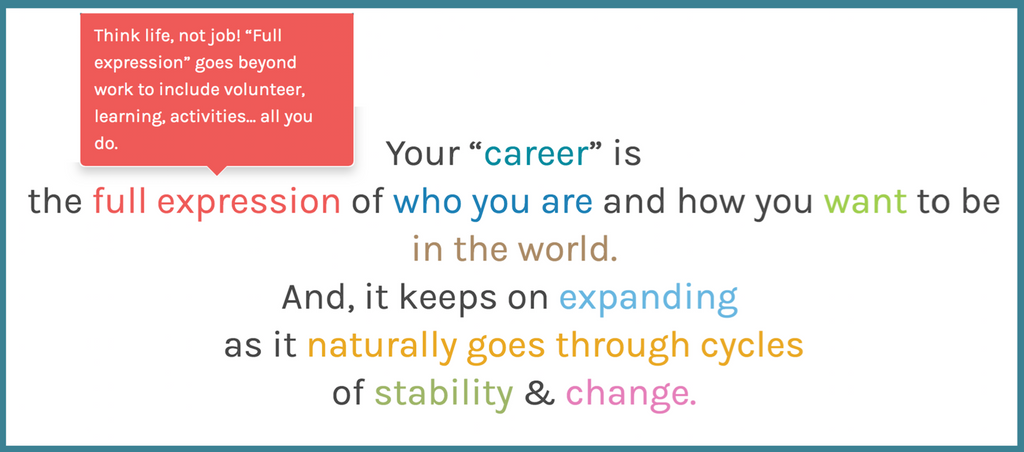In The Gifts of Imperfection, Brené Brown (2010) defined authenticity as the daily practice of letting go of who we think we are supposed to be and embracing who we are. When considering life or career transitions, Brown’s definition is relevant. Her “embracing who we are” resonates with our definition of career as “the full expression of who you are and how you want to be in the world. And, it keeps on expanding as it naturally goes through cycles of stability and change” (Franklin, 2015, p. 451).
In this definition, “who you are” is operationalized into the six elements - Desires, Strengths, Personal Qualities, Other People, Natural Interests and Assets - holistically organized within our one page Clarification Sketch (see Figure 1). Now implemented in the Who You Are Matters! Platform called Online Storyteller, clients engage in moment-by-moment storytelling, and their helping professional captures client narratives “on the fly” in a reflective practice that builds client self-awareness and authenticity, and delivers a response to the critical question, “who are you?”
Reflective practice makes meaning from experience and transforms insights into practical strategies for personal growth and organizational impact. It is captured and expressed on a systematic basis. When the process becomes a habitual activity, patterns and connections become visible (Chartered Institute of Personnel and Development).
For professionals, engaging in narrative reflective practice goes beyond active listening, mirroring, paraphrasing and other counseling techniques. Clients benefit when expressing and capturing elements from stories. Supporting reflective practice as a habit, and generating meaningful future possibilities from emergent patterns drives client growth. The HEROIC-g Narrative Assessment framework (Feller & Franklin, 2020) represents one such approach to evidence-based, reflective practice.
With the growing interest in transformative learning opportunities embedded in Experiential Learning (EL), reflective practice is the key to unlock career development’s value within EL. A CERIC-funded project by OneLifeTools
focuses on leading professionals to resources to support solutions that advance reflection on experiential learning, connections back to academic learning, and forward to identity and learners’ career goals to proudly shape the world.
Let’s finish with a fun example of reflective practice in action, from a CareerWise blog post: Imagine a 26-year-old Justin Trudeau sits before you. With a BA in literature from McGill and BEd from UBC, he seeks your career help, unsure of his “what’s next”. He has ideas – teacher? engineer? geographer? politics? – but he’s uncertain about his identity within them. He feels pressure from his parents, especially his father. What do you do?

References
Brown, B. (2010). The gifts of imperfection: Let go of who you think you're supposed to be and embrace who you are. Hazelden Publishing.
Chartered Institute of Personnel and Development. What is reflective practice? Retrieved from https://www.cipd.co.uk/Images/reflective-practice-guide_tcm18-12524.pdf
Feller, R., & Franklin, M. (2020). The HEROIC narrative assessment system: Helping undergrads navigate transitions. In P. Gardner & H. Maietta (Eds.). Advancing talent development: Steps toward a T-model infused undergraduate education. Business Expert Press.
Franklin, M. (2015). CareerCycles: A holistic and narrative method of practice. In B. C. Shepard, P. S. Mani (Eds.), Career development practice in Canada: Perspectives, principles, and professionalism (pp. 441-463). Toronto: CERIC.


Leave a comment: